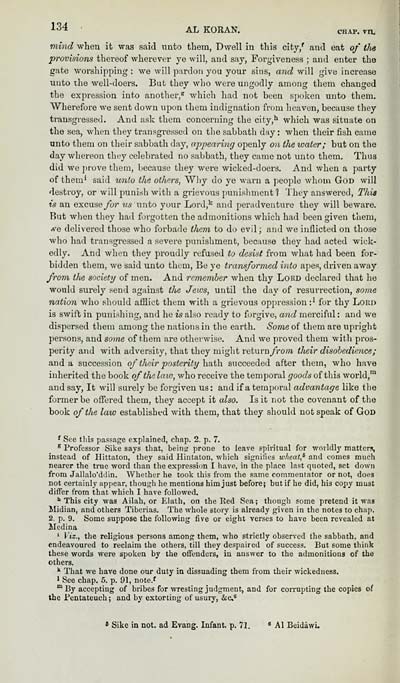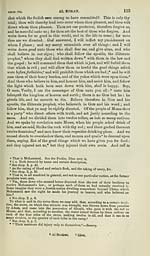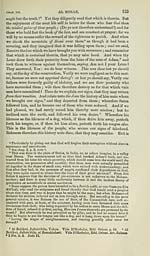Download files
Complete book:
Individual page:
Thumbnail gallery: Grid view | List view

134 AL KORAN. CHAP. vn.
mind when it was said unto them, Dwell in this city/ and oat of the
provisions thereof wherever ye will, and say, Forgiveness ; and enter the
gate worshipping : we will jiardon you your sins, and will give increase
unto the well-doers. But tliey who were ungodly among them changed
the expression into another,^ which had not been spoken unto them.
Wherefore we sent down upon them indignation from heaven, because they
transgressed. And ask them concerning the city,"* which was situate on
the sea, when they transgressed on tlie sabbath day : when tlieir fish came
onto them on their sabbath day, appearhig openly on the water; but on the
day whereon they celebrated no sabbath, they came not unto them. Thus
did we prove them, because they were wicked-doers. And when a party
of them' said unto the others, Wliy do ye warn a people whom God will
destroy, or will punish with a grievous punisliment ? Ihey answered. This
is an excuse ybr us unto your Lord,^ and peradventure they will beware.
But wlien they had forgotten the admonitions which had been given tliem,
jfe delivered those who forbade them to do evil; and we inflicted on those
who had transgressed a severe punishment, because they had acted wick-
edly. And when they proudly refused to desist from what had been for-
bidden them, we said unto them, Be ye transformed into apes, driven away
from tJie society of men. And remember when thy Lord declared that he
would surely send against tlie Jews, until the day of resurrection, some
nation who should afflict them with a grievous oppression :^ for thy Loud
is swift in punishing, and he is also ready to forgive, and merciful : and we
dispersed them among the nations in the earth. Some of them are upright
persons, and some of them are otherwise. And we proved them with pros-
perity and with adversity, that they might return/ro/?i their disobedience;
and a succession of their posterity hath succeeded after them, who have
inherited the book ofthelaio, who receive the temporal goods of this world,""
and say. It will surely be forgiven us : and if a temporal advantage like the
former be offered them, they accept it also. Is it not the covenant of the
book of the law established with them, that they should not speak of God
' See this passage explained, chap. 2. p. 7.
* Professor Sike says that, beiiit: prone to leave spiritual for woildly matters,
instead of Hittaton, they said Hintaton, which signifies wheat,^ and conies much
nearer the titie word than the expression I have, in the place last quoted, set down
from Jallalo'd<lin. Whether he took this from the same commentator or not, does
not certainly apjiear, though he mentions him just before; but if he did, his copy must
differ from that which I have followed.
•^ This city was Ailah, or Elath, on the Red Sea; though some pretend it was
Midian, and others Tiberias. The whole story is already given in the notes to chap.
2, p. 9. Some suppose the following five or eight verses to have been revealed at
Medina
' Viz., the religious persons among them, who strictly observed the sabbath, and
endeavoured to reclaim the others, till they despaired of success. But some think
these words were spoken by the offenders, in answer to the admonitions of the
others.
'^ That we have done our duty in dissuading them from their wickedness.
' See chap. 5. p. 91, note.'
™ By accepting of bribes for wresting judgment, and for corrupting the copies of
the Pentateuch ; and by extorting of usury, &c.*
* Sike in not. ad Evang. Infant, p. 71. • Al BeidawL
mind when it was said unto them, Dwell in this city/ and oat of the
provisions thereof wherever ye will, and say, Forgiveness ; and enter the
gate worshipping : we will jiardon you your sins, and will give increase
unto the well-doers. But tliey who were ungodly among them changed
the expression into another,^ which had not been spoken unto them.
Wherefore we sent down upon them indignation from heaven, because they
transgressed. And ask them concerning the city,"* which was situate on
the sea, when they transgressed on tlie sabbath day : when tlieir fish came
onto them on their sabbath day, appearhig openly on the water; but on the
day whereon they celebrated no sabbath, they came not unto them. Thus
did we prove them, because they were wicked-doers. And when a party
of them' said unto the others, Wliy do ye warn a people whom God will
destroy, or will punish with a grievous punisliment ? Ihey answered. This
is an excuse ybr us unto your Lord,^ and peradventure they will beware.
But wlien they had forgotten the admonitions which had been given tliem,
jfe delivered those who forbade them to do evil; and we inflicted on those
who had transgressed a severe punishment, because they had acted wick-
edly. And when they proudly refused to desist from what had been for-
bidden them, we said unto them, Be ye transformed into apes, driven away
from tJie society of men. And remember when thy Lord declared that he
would surely send against tlie Jews, until the day of resurrection, some
nation who should afflict them with a grievous oppression :^ for thy Loud
is swift in punishing, and he is also ready to forgive, and merciful : and we
dispersed them among the nations in the earth. Some of them are upright
persons, and some of them are otherwise. And we proved them with pros-
perity and with adversity, that they might return/ro/?i their disobedience;
and a succession of their posterity hath succeeded after them, who have
inherited the book ofthelaio, who receive the temporal goods of this world,""
and say. It will surely be forgiven us : and if a temporal advantage like the
former be offered them, they accept it also. Is it not the covenant of the
book of the law established with them, that they should not speak of God
' See this passage explained, chap. 2. p. 7.
* Professor Sike says that, beiiit: prone to leave spiritual for woildly matters,
instead of Hittaton, they said Hintaton, which signifies wheat,^ and conies much
nearer the titie word than the expression I have, in the place last quoted, set down
from Jallalo'd<lin. Whether he took this from the same commentator or not, does
not certainly apjiear, though he mentions him just before; but if he did, his copy must
differ from that which I have followed.
•^ This city was Ailah, or Elath, on the Red Sea; though some pretend it was
Midian, and others Tiberias. The whole story is already given in the notes to chap.
2, p. 9. Some suppose the following five or eight verses to have been revealed at
Medina
' Viz., the religious persons among them, who strictly observed the sabbath, and
endeavoured to reclaim the others, till they despaired of success. But some think
these words were spoken by the offenders, in answer to the admonitions of the
others.
'^ That we have done our duty in dissuading them from their wickedness.
' See chap. 5. p. 91, note.'
™ By accepting of bribes for wresting judgment, and for corrupting the copies of
the Pentateuch ; and by extorting of usury, &c.*
* Sike in not. ad Evang. Infant, p. 71. • Al BeidawL
Set display mode to: Large image | Transcription
Images and transcriptions on this page, including medium image downloads, may be used under the Creative Commons Attribution 4.0 International Licence unless otherwise stated. ![]()
| Early Gaelic Book Collections > J. F. Campbell Collection > Koran: or, Alcoran of Mohammed > (288) |
|---|
| Permanent URL | https://digital.nls.uk/77137263 |
|---|
| Description | Volumes from a collection of 610 books rich in Highland folklore, Ossianic literature and other Celtic subjects. Many of the books annotated by John Francis Campbell of Islay, who assembled the collection. |
|---|
| Description | Selected items from five 'Special and Named Printed Collections'. Includes books in Gaelic and other Celtic languages, works about the Gaels, their languages, literature, culture and history. |
|---|

